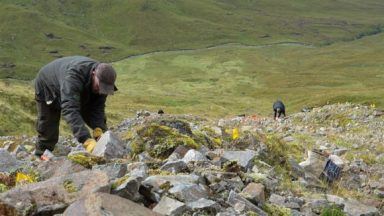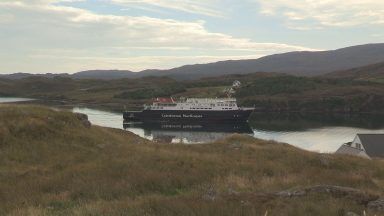Fears that timetable changes in air services between Inverness and Stornoway, and Stornoway and Benbecula, could have a significant impact on the delivery of consultant clinics across the islands, have been raised at a special meeting of the board of NHS Western Isles.
Top of the board’s agenda was the impact on patients and clinical staff of the awarding by Comhairle nan Eilean Siar of a new four year contract for the Benbecula to Stornoway air route to Hebridean Air Services (HAS).
That contract has seen a much smaller plane operating the route than under the previous operator, Loganair, and with the loss of a connected timetable of air services between Inverness and Benbecula via Stornoway, which was relied on by consultants travelling from NHS Highland to deliver clinics locally.
Previously, Loganair provided a timetabled connecting service from Inverness to Benbecula allowing consultants from Raigmore Hospital to travel from Inverness on a 7am flight that landed in Stornoway before travelling onwards to Benbecula.
The timetabled connecting flights from Stornoway to Benbecula ended when the new contract began in April, and while Loganair’s early morning Inverness to Stornoway flight has continued, it is now set to end at the beginning of August.
NHS Western Isles Director of Finance and Procurement, Debbie Bozkurt, told the Board meeting that the lack of a connecting flight on a Tuesday and Thursday would mean that NHS Western consultants who undertook clinics in the southern isles and travelling down on a Tuesday now cannot get back until the following Friday, posing a threat to more than 700 clinics.
HAS now runs the service with the much smaller plane, offering a capacity of up to 8 seats per flight, and the board was told of concerns that the plane has a number of significant access issues affecting patients with disabilities and other mobility impairments, and for those with other medical conditions, who cannot get on board.
This means that even if seats were available on a service some patients cannot access the plane, and currently have to find alternative routes to attend clinics in Stornoway, including by ferry and taxi, journeys that were described by Chair of the Board, Gill McCannon as being “arduous”.
Concerns were also expressed over the reliability of air services in the coming winter months with the possibility of the smaller aircraft being more likely to be affected by the weather, resulting in cancellations on return or single legs of the Stornoway to Benbecula journey, and the impact of such cancellations on the well-being of patients.
The challenges facing patients travelling from the southern islands for chemotherapy was highlighted as a specific concern to the meeting, as they often require companions to travel with them.
A lack of capacity on the plane has made it difficult to secure the additional space for companion travel, and, as a result, many are taking the journey via road and ferry, and with the small ferry linking the islands now facing capacity issues following a significant jump in demand for space.
That situation is likely to worsen in the reduced winter operations of the ferry, the Board were told, and with the likelihood of weather-related cancellations in the winter months.
Timetable changes with the new air service has already resulted in the ENT clinics previously held in Barra being cancelled, Debbie Bozkurt, told the meeting, and that waiting times could be set to increase for a range of appointments as a result of the changes.
Ms Bozkurt also highlighted the financial implications for the NHS’s budget if the current issues were not resolved.
Ms Bozkurt told the meeting that while the powers of the NHS locally do not by law “extend to the general provision of public passenger transport services,” they do cover reasonable costs of patient travel to attend hospital and other medical appointments.
Currently NHS Western Isles spends more than £3m per year on patient travel, with additional costs of staff and clinical travel bringing the Board’s spend with local travel infrastructure to £4m.
In terms of the awarding of the new air service contract, Ms Bozkurt said:
“NHS Western Isles were not involved in the tender process and nor should we. That is the responsibility of the Comhairle. However, we would have expected to be consulted on the tender like other stakeholders. In relation to the capacity, one area we’re worried about in the PSO is that we understand the tender specification for the recent procurement stated the Comhairle will not score on the proposed aircraft capacity. That was a very worrying statement for us.”
NHSWI Chief Executive, Gordon Jamieson, warned “we will not be able to remove or resolve all the problems that have risen,” adding:
“There is no doubt that waiting times are at high risk of becoming longer. The issue is that waiting times in the Outer Hebrides, relative to most other NHS Board areas, have been very short, and what we might see is considerable lengthening here of waits in some specialties.”
Mr Jamieson added that there was “a limit on how long consultant staff can be away from their base, in terms of their day-to-day workload, appointments and on-call commitments, ” stating:
“Their commitment to come here and work around challenges and put themselves at a level of additional time away, speaks for itself.”
Chair of the Board, Ms Gill McCannon, said that the challenges posed by the changes to the flights, had “challenged us in ways that I have never seen staff challenged,” adding:
“Patients are at the heart of what we are here for and it is painful to see what has happened and the impact on them, in terms of this service. I commend everyone who has been trying to provide workarounds for patients – they have gone above and beyond.”
Board members agreed to a range of recommendations, including working with Caledonian MacBrayne to block book vehicle spaces; continuing discussions with Loganair to discuss the early morning flight from Inverness; to undertake an assessment of all clinics to consider where remote clinics can be provided; and to continue to work with NHS Highland on any reasonable changes that could be made to safeguard services.
In a statement Comhairle nan Eilean Siar, confirmed that in awarding the contract for the air service between Benbecula and Stornoway, HAS had “submitted the only bid that was within the Comhairle’s budget and met the required contract length.”
Cllr Uisdean Robertson, Chair of Comhairle nan Eilean Siar’s Transportation and Infrastructure Committee, said: “Over the years, Comhairle nan Eilean Siar has frequently called for NHS and Transport Scotland collaboration and financial support in the operation of the Stornoway to Benbecula PSO contract.
“At present NHS Western Isles do not contribute anything financially to the service and do not therefore have a formal involvement in the tender process.
“The Comhairle welcomes any change of heart from the NHS as to planning and, presumably, supporting the PSO contract.
Cllr Robertson concluded: “Comhairle nan Eilean Siar would welcome any financial support from NHS Western Isles or Scottish Government which would safeguard the future of the service and open the door to potential service improvements, including improved accessibility, frequency, and the opportunity to reinstate the Barra leg of the PSO.”
Follow STV News on WhatsApp
Scan the QR code on your mobile device for all the latest news from around the country


 Getty Images
Getty Images
























